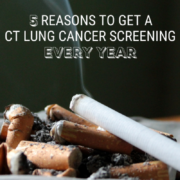5 Reasons to Get a CT Lung Cancer Screening Every Year
Have you ever had a CT lung cancer screening exam? Maybe you’ve never even heard of it. If you have a history of smoking, you may want to read on. This exam is a test for patients with a heavy smoking history but no current lung cancer symptoms, and it could potentially save your life.
The US Preventive Services Task Force and radiology societies are now recommending this annual screening exam for people meeting the following criteria:
- 50-80 years old AND
- Have smoked at least 20 pack-years (i.e. one pack/day for 20 years) AND
- Currently smoke OR have quit smoking within the last 15 years
This recommendation is a recent change in criteria in part to capture more African American patients who are at increased risk for developing lung cancer with a shorter smoking history than other racial groups.
It is important to note that the Centers for Medicare and Medicaid Services currently only cover this exam for those 50-77 years old with a 20 pack-year history. CMS is now taking open public comments for consideration, and there are possible insurance coverage changes happening in the future to reflect these new recommendations.
*Update 7/23/21 – BlueCross, Signa and Aetna recently updated their guidelines to reflect these new recommendations.
So, if you or someone you love meets the qualifications for this screening exam, we want you to understand why it is so important. Here are our top 5 reasons to get a CT lung cancer screening every year.
1. Lung cancer is the #1 cause of cancer death among men and women in the U.S.
Lung cancer is the most common cancer worldwide, and it impacts minorities at even higher rates. Don’t allow yourself to fall victim to a statistic. If you’re at high risk, or think you might be, don’t wait any longer for a CT Lung Cancer Screening. Talk to your doctor, check with your insurance provider, and give our office a call to schedule your exam. Having these conversations now is worth a lifetime of health in the future.
2. Early detection is the biggest factor for survival
Unfortunately, patients with early lung cancers often have no symptoms (things like weight loss or difficulty breathing). Once there are symptoms, lung cancer is often more advanced and survival rates are lower. This is why early detection is so crucial. According to the American Lung Association, lung cancer screening exams are shown to reduce lung cancer deaths by 14-20% among high-risk populations by finding the disease at an earlier, more treatable stage.
3. A CT Lung Cancer Screening is a painless, fast, accurate test for identification of early lung cancers
Besides lung cancer, this CT screening exam detects other smoking-related conditions like COPD and vascular disease. These diseases can directly impact the quality of your life so why not treat them sooner rather than later? An hour of your day could save your life.
4. Simple exam involves no needles and no contrast injection
Similar to getting a chest X-ray, the lung cancer screening CT is performed with a few breath holds. However, CT provides much more detail and allows radiologists to find smaller lung nodules. By simply laying on a table and letting the machine do all the work, you could be adding years to your life.
5. Designed to be low radiation exposure
We all encounter radiation every day. A CT lung cancer screening exam is equal to about 6 months of normal radiation exposure from soil and the sun. As with all of our imaging exams, we take every necessary precaution to ensure patient safety and limit the radiation exposure. It is always important to remember that the potential for life-saving early detection far outweighs any risk of limited radiation exposure.
As you can see, getting a CT lung cancer screening exam every year is a simple task that offers undeniable benefits to patients who are at high risk. There are many more reasons why taking control of your health and having screening exams are important, but we hope these five reasons will help you to make the best decision for your health in the future.


